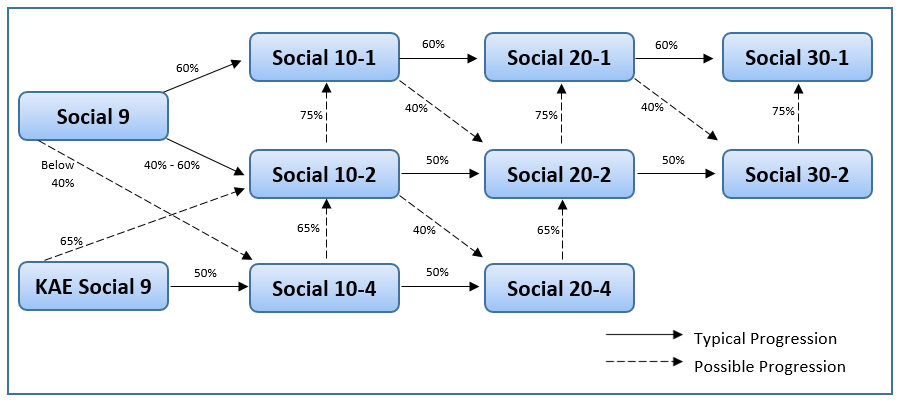Social Studies
The high school Social Studies program is designed to engage you in active and responsible citizenship while you learn about the world around you. Upon completion of the program, you will be expected to understand consequences and interactions in an increasingly globalized world within a Canadian context. The goal of the Social Studies program is to promote a sense of belonging and acceptance as you engage in active and responsible citizenship. The program has a strong focus on Canadian and Alberta history, and you will become involved in your own learning by asking questions, sharing ideas and understandings and working with others.
Social Studies is learning about the world around you, and what could be more relevant than that? Social Studies is an essential course in Grade 10, 11 and 12, and every student must complete Social 30-1 or 30-2 to qualify for a high school diploma.
Social Studies/Études Sociales 10-1 (5 credits)
Recommended Prerequisite: 60% in Social Studies 9
Recommended French Prerequisite: 60% in Études Sociales 9 and registration in FLA 10
Perspectives on Globalization - Students will explore multiple perspectives on the origins of globalization and the local, national and international impacts of globalization on lands, cultures, economies, human rights and quality of life. Students will examine the relationships among globalization, citizenship and identity to enhance skills for citizenship in a globalizing world. The infusion of multiple perspectives will allow students to examine the effects of globalization on peoples in Canada and throughout the world, including the impact on Aboriginal and Francophone communities.
Social Studies/Études Sociales 10-2 (5 credits)
Recommended Prerequisite: 40%-60% in Social Studies 9 or 65% (or greater) in KAE Social 9
Living in a Globalizing World - Students will explore historical aspects of globalization as well as the effects of globalization on lands, cultures, human rights and quality of life. Students will explore the relationships among globalization, citizenship and identity. The infusion of multiple perspectives will allow students to examine the effects of globalization on peoples in Canada and other locations, including the impact on Aboriginal and Francophone communities. Students will develop skills to respond to issues emerging in an increasingly globalized world.
Social Studies/Études Sociales 20-1 (5 credits)
Recommended Prerequisite: 60% in Social Studies 10-1
Recommended French Prerequisite: 60% in Études Sociales 10-1 and registration in FLA 20
Students will explore the complexities of nationalism in Canadian and international contexts. They will study the origins of nationalism and the influence of nationalism on regional, international and global relations. The infusions of multiple perspectives will allow students to develop understandings of nationalism and how nationalism contributes to the citizenship and identities of peoples in Canada.
Social Studies 20-2/Études Sociales 20-2 (5 credits)
Recommended Prerequisite: 50% in Social Studies 10-2 or 40% (or greater) in Social 10-2
Students will understand historical and contemporary understandings of nationalism in Canada and the world. They will explore the origins of nationalism as well as the impacts of nationalism on individuals and communities in Canada and other locations. Examples of nationalism, ultra-nationalism, supra-nationalism and internationalism will be examined from multiple perspectives. Students will develop personal and civic responses to emergent issues related to nationalism.
Social Studies/Études Sociales 30-1 (5 credits)
Recommended Prerequisite: 60% in Social Studies 20-1
Recommended French Prerequisite: 60% in Études Sociales 20-1 and FLA 30
Students will explore the origins and complexities of ideologies and examine multiple perspectives regarding the principles of classical and modern liberalism. An analysis of various political and economic systems will allow students to assess the viability of the principles of liberalism. Developing understandings of the roles and responsibilities associated with citizenship will encourage students to respond to emergent global issues. This is a diploma course - students will write a government exam worth 30% of their final mark.
Social Studies/Études Sociales 30-2 (5 credits)
Recommended Prerequisite: 50% in Social Studies 20-2 or 40% (or greater) in Social 20-1
Recommended French Prerequisite: 50% in Études Sociales 20-2 or 40% in Études Sociales 20-1 and FLA 30
In the first unit, students will acquire an understanding of major political and economic systems. The second unit is a study of the global interaction of nations, how nations are self-interested and how international organizations have been evolving to promote cooperation, peace and humanitarianism. This is a diploma course - students will write a government exam worth 30% of their final mark.
Knowledge & Employability
Social Studies 10-4, 20-4 (5 credits)
Learning related to the core concepts of citizenship and identity is achieved through focused content at each grade level. The six strands of social studies reflect the interdisciplinary nature of social studies. The strands are interrelated and constitute the basis for the learning outcomes in the program of studies. The five strands are Time, Continuity and Change; The Land: Places and People; Power, Authority and Decision Making; Economics and Resources; and Global Connections.
Students who achieve a mark of 65% or over in 10-4 or 20-4, may wish to upgrade to the -2 strand. For example, if a student attains 65% in Social Studies 10-4, they may upgrade to 10-2. Please refer to the Course Sequencing chart above for guidelines.



